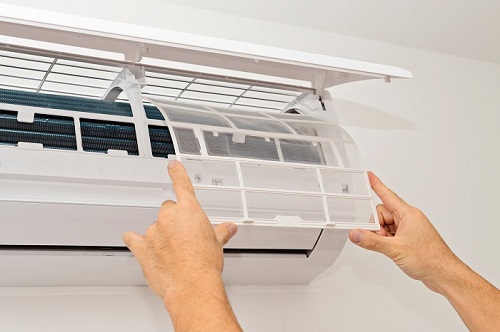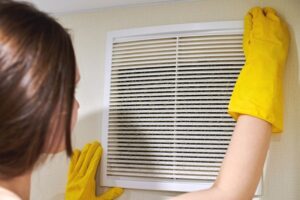Signs It’s Time to Change an HVAC Filter

Indoor air quality is one of the most important determinants of respiratory health, and it’s relatively easy to protect. However, not all homeowners realize how important it is to stay on top of changing their HVAC air filters so that they can maintain clean air.
The best solution is to sign up for a subscription service. Airzey air filters are a good example. The company offers high-quality MERV 13 filters that feature pleated designs and utilize unique nanofiber technologies and makes it easy for homeowners to remember when to change them by letting them sign up for recurring deliveries online.
If it’s been more than a few months since the last time a homeowner checked the HVAC filters, the chances are good that they need to be replaced. However, because some homeowners need extra proof that it’s worth investing a small amount of money in protecting their families’ respiratory health, this article will review some of the top signs it’s time to change the HVAC filters.

More Dust Than Usual
While it’s normal for some dust to build up inside of even well-kept homes, most homeowners can tell when there’s more of it than usual. If it seems like dust is building up on every surface of the home or circulating visibly through the air, the chances are good that an air filter change is in order.
The reason that homes get dusty when their air filters are clogged is that these products are designed to catch dust, dirt, and airborne contaminants before they are introduced into the living areas, but they can only handle so much of it. Once the filter is full, any additional dust will make its way into the ducts and get spread throughout the home.
The problem may be particularly noticeable around air vents. However, homeowners should also pay attention to how much dust is settling on their furniture, window blinds, and decor. That buildup both looks bad and exacerbates allergy symptoms, and it’s very easy to resolve.
Burning Smells
Most homeowners don’t need to be told twice that there’s something wrong if they start to notice burning smells coming from their air ducts. The situation may not be as dire as it seems, though. Sometimes, it’s just dust burning off after the system hasn’t been used for a while, but more often than not, the culprit is a dirty air filter.
This problem occurs because air filters aren’t just designed to stop contaminants from getting into the living spaces of a home. They’re also there to protect the HVAC equipment itself by preventing dust and debris from getting sucked into the blower or reaching the heat exchanger. Both of these elements can wind up overheating if they get coated in dust, and both can cause burning smells.
Homeowners who notice this issue should shut their systems off to let them cool down and change the filters right away. Be sure to avoid trouble in the future by setting a schedule for HVAC filter changes, though, because overheating parts will reduce the longevity of the furnace and air conditioning unit.
Increased Allergy Symptoms
If anyone in the household suffers from allergies or asthma, a dirty air filter can make their symptoms much worse. Eventually, even people with otherwise healthy and normal respiratory tracts will start to notice symptoms, but people with underlying issues are almost always the first to notice. Symptoms of allergen exposure often include:
- Sore throat
- Red eyes
- Runny nose
- Dizziness
- Headaches
- Sinus infections
- Recurrent colds
- Frequent asthma attacks
The dust that collects in air filters during normal use isn’t the only contaminant that can cause people to get sick. Clogged air filters also promote the growth of microbes, including bacteria and mold spores.
Wondering why clogged filters would lead to mold growth? The answer is relatively simple, at least when it comes to air conditioning. When the filters get clogged, it stops air from reaching the evaporator coils. The normal condensation on the coils freezes as a result, which creates excess moisture. This issue is exacerbated by the fact that clogged air filters don’t effectively remove humidity from the air.
In most cases, changing out the air filter and giving the house a good clean to make up for the neglect will get rid of any allergy and asthma symptoms by improving indoor air quality. However, mold growth in the ducts or elsewhere in the home can also cause worrisome respiratory issues, and it may need to be removed by a professional if the situation gets out of control.
Reduced HVAC Efficiency
Dirty HVAC filters can reduce the efficiency of both furnaces and air conditioners. Homeowners might notice that the air coming from the vents in the summer is warm instead of cool or that it’s taking longer than usual for the house to warm up in the winter. Even if the reductions in efficiency aren’t obvious during normal use, most people notice them when it comes time to pay the monthly bills.
There are two factors at work causing reductions in efficiency. The first is very straightforward. Dirty air filters limit how much air is circulating through the ducts, which makes it take longer to heat or cool rooms.
The second problem is a little more subtle. When dirty air is introduced into the HVAC equipment itself, that can also affect efficiency. The lack of proper airflow combined with added dirt and debris forces the furnace and air conditioner to work harder than usual to maintain the same comfort levels, which doesn’t just send monthly bills skyrocketing but also reduces the expected longevity of the system.
Stay on Top of Filter Changes
There’s no need for homeowners and their families to deal with any of the issues described above. High-quality HVAC filters are quite affordable, and changing them is easy. Come up with a schedule that reflects the household’s needs, and stick to it. For most households, that means changing the filter every three months. If one or more residents have underlying respiratory issues, consider changing it monthly instead. Either way, signing up for a subscription service and automatic deliveries will make it easier to stay on top of this vital home maintenance task.





